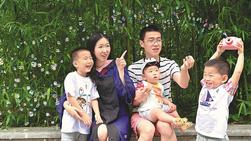Supervision on in-home services to facilitate flexible options for parents
 A family pose for a photo at the Central University of Finance and Economics in Beijing. (PHOTO PROVIDED TO CHINA DAILY)
A family pose for a photo at the Central University of Finance and Economics in Beijing. (PHOTO PROVIDED TO CHINA DAILY)
China's top health authority has released its first regulation on home nursery care providers as part of its efforts to develop various childcare services to alleviate pressure on parents and lift birthrates.
The National Health Commission published a trial rule on home nursery care providers — agencies that transform residential places into nursery care facilities for children aged three and under — on March 15. The document is soliciting public opinion until April 14.
The trial regulation said that such a service provider can look after no more than five children, and each caretaker can look after a maximum of three babies. The per capita floor space for each child should meet a minimum of nine square meters.
Caretakers should be experienced or have an education background in nursery care and child health, and receive training in mental health, food safety, first aid and fire safety. People with a history of mental illness or criminal records are barred from the occupation, it said.
Home nursery care providers should register with local market supervision authorities and health authorities and will be subject to on-site inspections.
They are also required to install video surveillance cameras to cover all living and play areas and footage should be stored for at least 90 days.
At such a facility, children must be offered daily care, balanced diets and early childhood education, it said.
The regulation added that community officials should step up the management and supervision of home nursery care providers and report problems to local health commissions promptly.
"Families with babies aged three or under are in need of care services that are nearby and convenient, and in-home nursery care facilities that make use of residential places in neighborhoods can meet such demands and create convenience for parents to drop off and pick up their kids," said Mao Zhuoyan, a professor at Capital University of Economics and Business' School of Labor Economics.
She added that capping the number of children under five means that the facility will resemble a home environment and make it easier for them to get used to.
Inadequate nursery care supplies in China have long been blamed for contributing to squeezing schedules of mothers and hindering families from having more babies.
Yang Wenzhuang, head of the commission's department of population monitoring and family development, said in June that China had over 37 million children aged three and under. More than one-third of families expressed strong demands for nursery care services, but only six percent ended up being admitted into a facility.
A survey conducted by the commission and released in 2019 also shows that families in need of nursery care services are the most concerned about their distance from homes, their safety and the credentials of caretakers.
Due to declining birthrates over the years and a historic drop in population registered in 2022, authorities have released a slew of measures to boost nursery care services.
For instance, a major plan that lays out key tasks and objectives during the 14th Five-Year Plan period (2021-25) states that the number of nursery care slots per 1,000 people should be increased to 4.5.
By the end of 2021, the number stood at 2.03.
The decision released by the top authority in July 2021 to allow all couples to have three children also proposes developing various forms of nursery care services, including building a number of affordable and convenient agencies, supporting employers to offer services at workplaces, strengthening community-based child care and formulating regulations on home-based nursery care.
Mao said that the establishment of home nursery care facilities is a positive addition to China's childcare system and reflects the country's efforts to meet the diverse demands of different families.
The new regulation also fills the gap in rules related to such service providers and will serve to supervise them while supporting their development, she added.


